
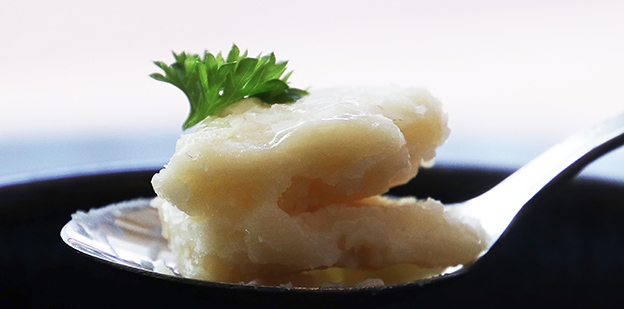
Ones to Watch: All sizzle, no guilt
Alternative fats are a potential gamechanger to revolutionize the meatless industry. As David W. Smith learns from eight players in the field, they not only offer a guilt-free indulgence but also contribute to sustainability by reducing the reliance on animal agriculture
Until around 2020, the plant-based meat industry appeared to be on an unstoppable rising curve of growth. Sales doubled in a decade, but they have since stagnated and many consumers have returned to eating animal products. A host of startups, showing staggering ingenuity, believe they have the answer to creating products that rival the real thing – adding alternative fats that are much closer in performance to the animal fats in real meat.
Research suggests they could be right. In consumer surveys, one of the most common complaints leveled at plant-based meats is that the taste and texture don’t match conventional meat. Using plant-derived oils, such as coconut and palm oil, is potentially not only damaging for the environment, but it also doesn’t provide the right consistency and flavor. Some of the issues are related to the low melting point of these oils and the fact they don’t sear or brown in the same way that animal fat does.
What is most astonishing about the startups trying to recreate the qualities of animal fat in the laboratory is the sheer variety of their approaches. It seems everyone has a different way of trying to reach the ‘Holy Grail’, which is to create plant-derived meat products that are as tasty and succulent as the real thing.
Smart thinking
Some startups don’t face too many regulatory hurdles because their ingredients and technologies are already commercially available. These include Spanish start-up CUBIQ, which wants to add its emulsions into hybrid products, Israel’s Gavan, which is using a protein extraction method to emulate the texture of real butter, and Californian bio-tech, Shiru, which is using AI and machine learning to select the right formulations of molecules.
But other start-ups, equally innovative, have put their faith in technologies that meet greater resistance from regulators. These include the Germany-based Cultimate, which is cultivating fat using stem cells derived from real animals, and UK startup, Hoxton Farms, which is also taking small cell samples from animals without harming them in the process.
Aside from the regulatory hurdles – which all believe are surmountable – the major challenges include scaling up laboratory-based research methods to the commercial scale. Linked to this, all are seeking more funding to expand their operations. But the energy and passion in the sector is impressive and some will undoubtedly succeed, opening up an exciting new chapter in the evolution of plant-derived proteins. Here we speak with a magnificent eight companies pushing the sector forward...
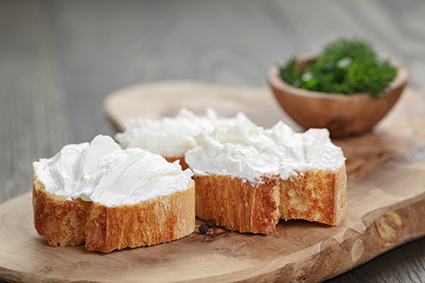
A HERO FOR THE FUTURE OF NUTRITION?
Spanish startup, CUBIQ Foods, is using cell culture and oil-water emulsions to replace the saturated vegetable and animal fat ingredients in food production. Its innovative method is backed by the world’s third-largest producer of meat, Cargill, which recently strengthened a mutual partnership to co-develop and commercialize novel fats.
Andrés Montefeltro, CEO & Co-founder of CUBIQ, argues the use of emulsions and hybrid products is the most realistic option when it comes to mitigating environmental impacts. “There’s a lot of hype around cultivated meat and fats,” he says. “But I don’t think we can mobilize all the capital needs to produce the requisite tons a year of any cultured product to positively impact the environment.”
The meat sector, he points out, is a US$1 trillion-a-year sector. But he estimates that cultured meats and fats can reach only 1% of that market, or 5% in the best-case scenario. “I believe in hybrid products that combine animal, alt-protein, and fat emulsions to build a new portfolio of sustainable, nutritional and healthier products,” he adds.
Montefeltro co-founded CUBIQ in 2018 with Raquel Revilla-Sanchez. As a result of their backgrounds in biology, they initially considered cultured meat options, but eventually settled on culturing fats as a value-added ingredient. Research began in 2019 and, after three years of development, they launched ‘Go!Drop’ – an oil-water emulsion established by hydrocolloids, which are gums and fibers.

“This emulsion is only 20% vegetal oil, 75% water and 3-5% fibers and gums,” Montefeltro adds. “It functionally replaces saturated vegetal very well, or tropical oils such as coconut oil in plant-based food, as well as animal fats in meat and dairy products. It’s our flagship product and working well in plant-based meat, alt dairy, bakery, and meat applications.”
Better by far
Compared to traditional animal products, Montefeltro says the emulsion has half the amount of fat, a third of the calories, and only a fifth of the impact on the environment. “Combining these ingredients and using water is out of the scope of traditional oil companies – water is forbidden in oil plants,” he notes. “The use of water also improves the juiciness of plant-based products.”
CUBIQ faces no regulatory hurdles as its products are formulated using approved food-grade ingredients. The Go!Drop emulsion has already been integrated into food products in Spain, used by Campofrio in a turkey-based sausage. “Our product is 30% lower in fat than the original one and is gaining acceptance with environmentally conscious consumers. We’re now working on developments with leading companies in the Europe and USA for products that will be on the market next year.”
On that note, next year, the Go!Mega 3 solution will go to market and will be the first Omega-3 solution for any food application. “Omega-3 has a growing demand due to its health benefits,” Montefeltro says. “Consumers want food with Omega-3 as it means not having to take any more daily pills. We’ve developed microencapsulation technology to protect the Omega-3 oil from oxidation, ensuring the highest quality of DHA and EPA, and protecting food products from the fish odor and flavor.”
Some customers are looking at the number of ingredients with care and manufacturers would like to mimic meat-based products with three ingredients, instead of seven
Next, by 2025, CUBIQ will launch ‘Go!Great’, a cultivated fat for flavoring food products. “The concept is that animal farming will be reduced in the coming years and cultivated flavors from different animal sources can enrich the sustainable flavor portfolio in new product developments,” he says.
One trend that runs counter to CUBIQ’s development of emulsions is reducing the number of ingredients in food. But Montefeltro says it is a misplaced reaction to failed product launches and predicts it will be a passing fad.
“The biggest-selling plant-based burger in the world is produced using a lot of ingredients,” Montefeltro adds. “But some customers are looking at the number of ingredients with care and manufacturers would like to mimic meat-based products with three ingredients, instead of seven. They end up making plant-based cookies instead of meat alternatives. We need to accept we’re evolving into an ingredient-based food chain. After two to three years of failure, customers will learn and this ‘trend’ for fewer ingredients will evolve.”
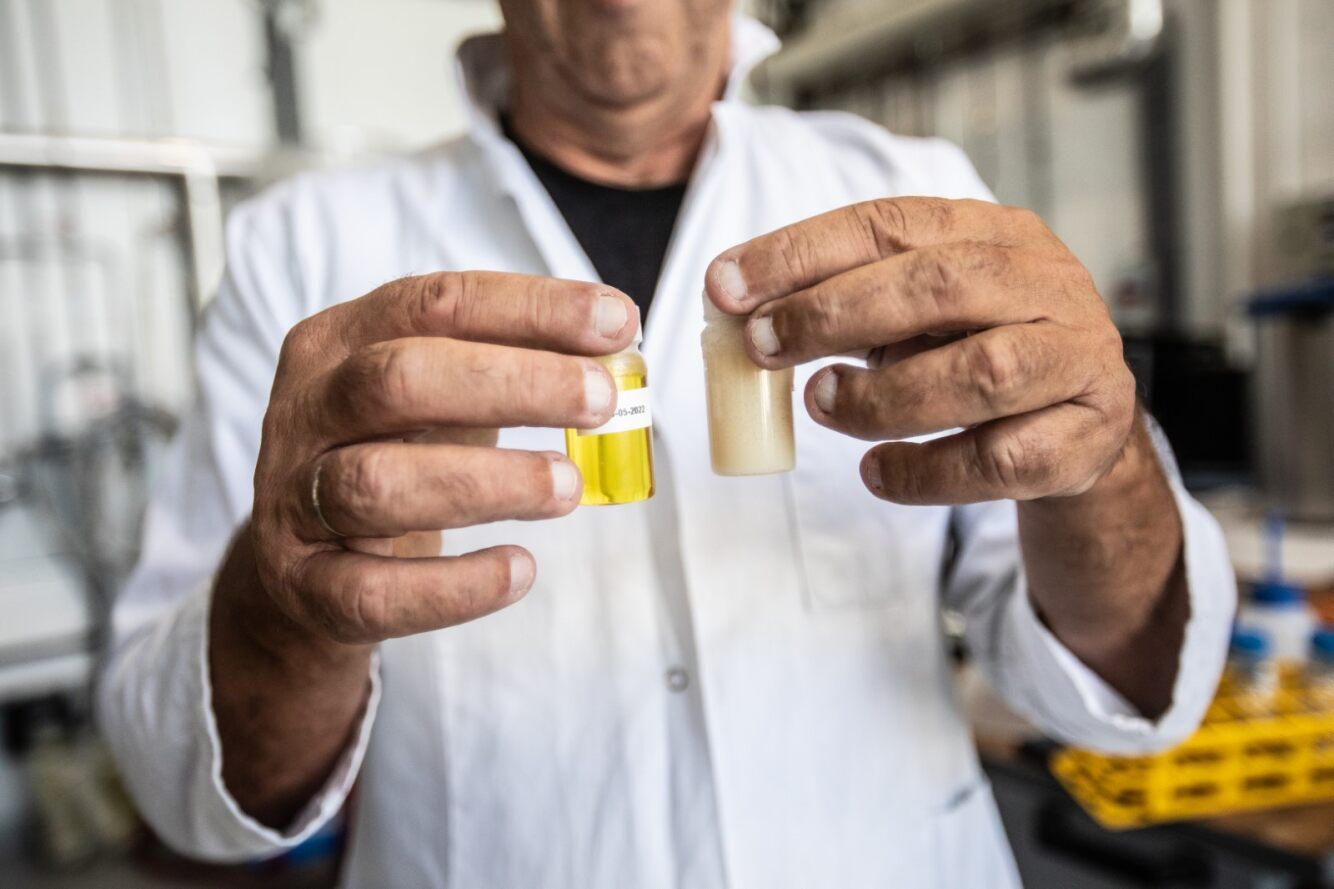
A LOCAL, CIRCULAR AND SUSTAINABLE ALTERNATIVE TO PALM OIL
Dutch startup, NoPalm Ingredients, is on a mission to challenge the over-dependence of the food industry on palm oil. The company has innovated a fermentation process using agri-food side streams, such as discarded potato peel and other vegetables, to produce oils and fats similar that are analogous to palm oil.
“By fermenting agri-food side streams, we reduce waste and minimize the pressure on natural resources,” begins Lars Langhout, CEO & Co-founder. “We’ve created a local and decentralized model, collaborating closely with our suppliers in a JV approach. It ensures a steady supply of agri-food side streams and reduces transportation-related emissions.”
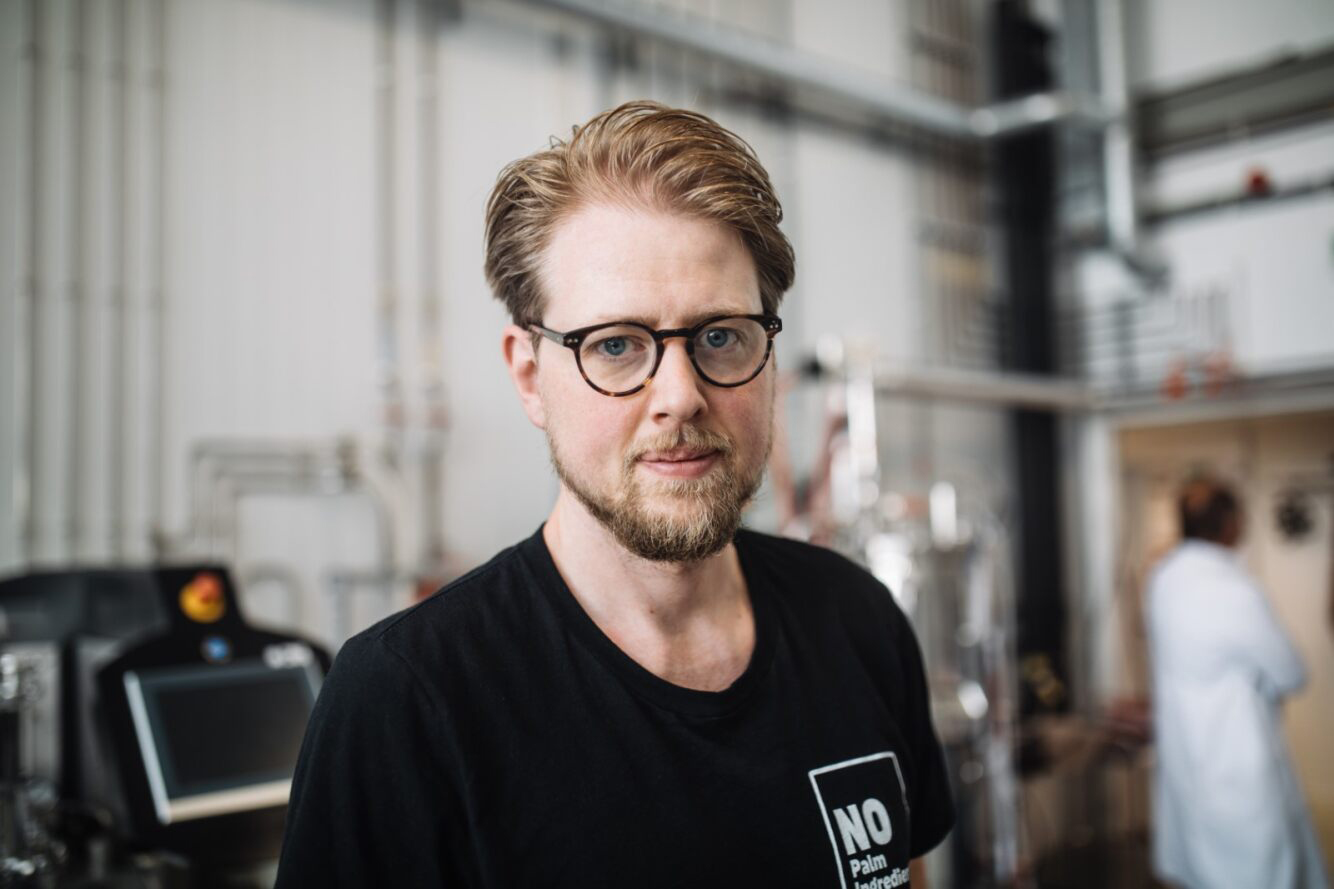
An LCA study conducted by the Bühler Group calculated that NoPalm Ingredients’ production methods resulted in a 90% reduction in carbon emissions and a 99% decrease in land use. “We tap into fat-containing feed-stocks like used cooking oil or ice cream,” Langhout continues. “These waste streams, once deemed fermentable, find their way into our brewery-grade bioreactors, where our proprietary yeast strains work their magic. By adjusting the parameters, we can achieve two to three times higher yields with our non-GMO yeast compared to state-of-the-art methods.”
Langhout says it is imperative to reduce the use of palm oil, which is found in about half of all packaged products, including food-stuffs, clothes and detergents. Research shows that, on average, we consume 8kg of palm oil per year. “It has long held a dominant position, primarily due to its versatility and affordability. It’s alarming that demand for palm oil continues to grow at a staggering rate of 4% each year, with no clear, sustainable supply strategy in sight.Our core challenge is finding alternative fats that meet these functional and cost requirements while reducing carbon emissions and land,” he says.
Chance meeting
NoPalm Ingredients was founded in 2021 when Langhout – following a 12-year career as a food consultant – was looking for a way to make a positive impact on sustainability. By chance, he met his co-founder, Professor Jeroen Hugenholtz, who had carried out groundbreaking academic research into the NoPalm Ingredients method. “We understood the immense potential and it ignited a passion in both of us to create a business focused on new ingredients,” Langhout recalls.
The NoPalm Ingredients production process is flexible enough to allow the properties of the oils and fats to be tailored to meet customers’ specific requirements. “We’ve fine-tuned it to influence the composition and solid fat content of our fats, shaping the melting profile and mouth-feel of our products,” he continues. “While our oils and fats can offer a neutral base through standard deodorization methods, our yeast strains bring forth distinctive umami, nutty, and toasty flavors.”
While our oils and fats can offer a neutral base through standard deodorization methods, our yeast strains bring forth distinctive umami, nutty, and toasty flavors
Two standout ingredients have emerged as stars of the NoPalm Ingredients portfolio though. “The first is a versatile palm olein mimetic, which we’ve crafted to excel in a wide range of applications, including fillings, plant-based dairy, biscuits, and as a carrier oil. Our second star is a shea butter mimetic, designed for one-to-one substitution as cocoa butter in confectionery applications. It also finds its place in margarine and various plant-based dairy and meat products.”
The most pressing challenge, though, remains the scaling-up of the circular production model. This year, the company celebrated its transition from lab-scale experimentation to a 2,000-liter fermentation process. Among other notable accomplishments, NoPalm Ingredients has installed a 400-liter fermenter. “This empowers us with in-house production capacity, enabling us to validate our developed production process on a pilot scale. This is a pivotal advancement toward eventual industrial-scale production,” Langhout concludes.
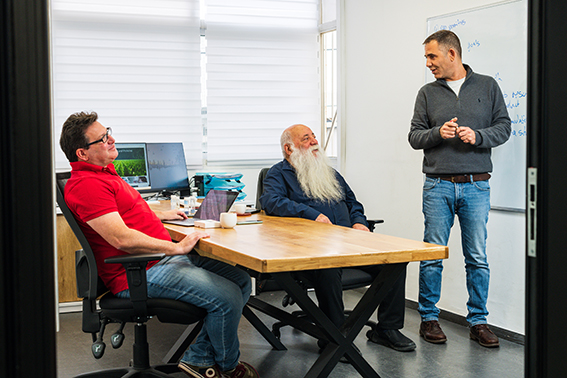
BUTTERING UP THE BAKING SECTOR, AND SLASHING SATURATED FAT BY 80%
Israeli food-tech startup, Gavan, has created a plant-based fat called ‘FaTRIX’ with the precise texture of butter, the company claims. Founder, Itai Cohen, says it is using a protein-extraction method to create the fat, which has been trialed in a brioche that was indistinguishable from buttery ones.
“In tests, people could not tell the difference,” he reports. “We’re more responsible for creating the texture of butter fat, which is hard to do in a brioche as it opens in a certain way and has the rolling effect in your mouth from all the fat. We bring a neutral fat to the table so it’s up to our customers to get the taste right, but it’s relatively easy to do by using extracts.”
Using the plant-based FaTRIX also reduces the percentage of saturated fat by around 80%, Cohen points out. “I guess that’s our USP. When you look at our goals, alongside reducing sugar levels, it’s all about saturated fat, and regulations are increasingly supportive of that. We’ve cut it by so much that a brioche can almost be healthy! And the same applies to croissants, pancakes, and other baked items. And we’re reducing calories by 30-50%!”
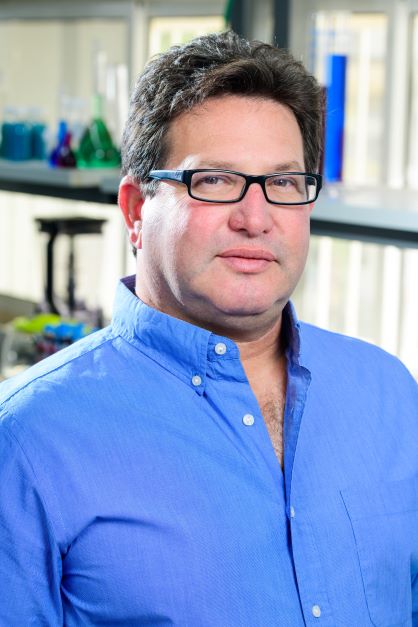
Gavan is Cohen’s fourth start-up in 15 years, each one in a different industry. He started the company in 2018, with co-founders, Allan Hazan, and world-famous Israeli chef, Uri Jeremias. “Changing sectors keeps me on my toes and learning new things,” he admits. “Or perhaps I just think the neighbor’s grass is greener. What drove me to choose the food sector was the understanding that people talk a lot about sustainability, but they never do sustainable stuff.”
As an example, Cohen cites the extraction of pea proteins. Around four fifths of each plant is thrown away, he says, despite protestations of sustainability. That led him to investigate more environmental methods. “What we’ve invented is a new method of extraction that uses the entire plant. It extracts the proteins and harnesses their ‘natural forces’. We create a natural physical skeleton that holds the water and vegetable oil together. It’s actually an emulsion, or an oleogel.”
Come together
The proteins are bound together to create a strong gel that is neutral in taste and can create a range of textures. “We can mimic the strength of beef fat on the one hand, or we can create butter, or liquid cream on the other,” Cohen adds. “We are involved in developing fats for baked goods and even creating cream cheese for alternative dairy. And we’re also involved in alternative meats, ice cream and even chocolate. Nothing is commercially available yet, but there are a lot of prototypes.”
Ultimately, we want them to choose these options because they taste better as well as because they’re healthier and more environmental
A commercial advantage for Gavan is the celebrity status of chef and co-founder, Jeremias, who effectively acts as ‘Chief Culinary Officer’. “Nothing goes out of our labs if he doesn’t approve it,” Cohen reveals. “He has a lot to do with the taste and textures. He got involved as he was also looking at the same technology to find new ingredients for his seafood restaurant, Uri Buri, in Acre. The restaurant has become the center of our business development, where he has a lot of samples. He’s a very special character. He’s instantly recognizable as he looks like Santa Claus!”
No regulatory approval is required as the ingredients are all readily available and he expect products containing FaTRIX to be on the market at the end of 2024. “Our goal is not to target vegans but the general population who want to eat plant-based food,” Cohen concludes. “Ultimately, we want them to choose these options because they taste better as well as being healthier and more environmental. We see this ingredient as a key in almost any industry. We have a lot of customers, especially in Europe and some in the USA. Our aim is to become a global company.”
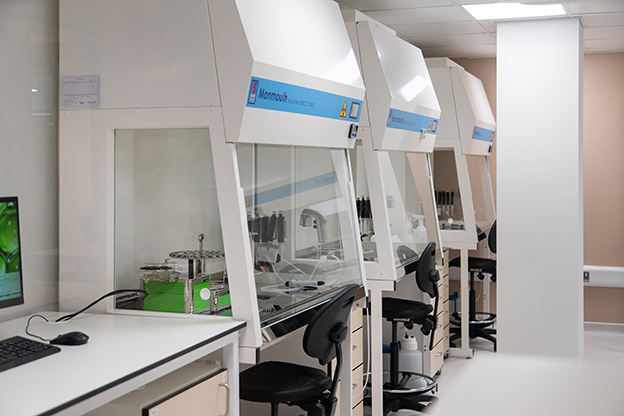
HOW TO ADD SIZZLE AND TASTE TO MEAT-FREE PRODUCTS
A love of food, and the conviction that plant-based alternatives are not tasty enough to satisfy traditional meat-eaters, inspired the creation of Hoxton Farms. The London-based start-up grows cultivated fat from small cell samples taken from animals without them coming to them. The process creates bioidentical fat that can be added to plant-based meats to make hybrid products that bring the taste much closer to real meat.
“We recognized the traditional meat industry was broken and deeply connected with a lot of environmental harm,” explains Max Jamilly, Co-founder. “We saw demand for meat alternatives soar, but as self-confessed foodies, they’re just not good enough. Consumers don’t need another plant-based burger. They need mouthwatering meat alternatives like pork belly, steak and bacon, which don’t rely on bland, unhealthy plant oils. The secret is in real fat – which makes the hybrid products sizzle, smell and taste like traditional meat.”

He and co-founder, Ed Steele, have known each other since pre-school, and share a desire to use technology to solve problems. The typical choice of life science entrepreneurs is to gravitate toward biomedical applications. But, even though Jamilly was doing his PhD in a hospital, the pair took a different route. “Medicines only impact a small proportion of the population,” he says. “In contrast, food affects all of us. It is the biggest connection we have with our bodies and the biggest lever for changing the world. Compared to the drawn-out process of clinical trials, we’ll also see the impact of food innovation much faster.”
Their initial focus is on pork fat, which has the most distinct taste and accounts for a growing share of global meat consumption. “We humanely collect a small sample of fat cells from a pig, before growing them in a cell culture. Over a few weeks, those cells grow into juicy fat tissue. Our customers can use our fats to add flavor and texture to plant-based meats.”
Plus points
In contrast, the plant oils used by a number of manufacturers of alternative meats have low temperature stability. They generate rancid and toxic byproducts, Jamilly stresses. And they tend to degrade quickly during transportation or storage, requiring the use of expensive antioxidants. “For consumers, meat alternatives using plant oils are also greasy as they have low melting and smoke points, and they don’t sear or brown like the real thing. Cultivated fat has the same structural and physical properties as traditional fat, is highly stable under extrusion, has a long shelf life, and retains its texture and taste during cooking.”
Jamilly points out that, although 2020 studies showed the consumption of plant-based alternatives had doubled in the previous 10 years, sales in the UK have since stagnated. Although some of this may be down to the cost-of-living crisis, the fundamental reason is flavor. “If you like meat, then vegan burgers and sausages may not cut it,” he says.
He reveals that the Hoxton Farms’ interdisciplinary team means mathematicians are working closely with biologists every day, allowing the use of machine learning to optimize the biological processes. As a result, the company is on track to reach cost-parity with plant oils at commercial scale.
Consumers need mouthwatering meat alternatives like pork belly, steak and bacon, which don’t rely on bland, unhealthy plant oils
The company is also seeking approval in markets such as the USA, Singapore, and the UK. It will need to follow the same regulatory process as cultivated meat, which was approved in Singapore in 2020 and in the USA this year. Following UPSIDE Foods’ and GOOD Meat’s USDA approvals in 2023, Jamilly expects an ingredients label of ‘cell-cultivated pork fat’.
In the meantime, they are scaling up capacity and collaborating with partners in preparation for commercial launch in 2025. “Our new facility will advance our research, help scale up production, and allow us to develop prototypes with customers,” Jamilly says. “It’s not the typical location for a farm, but committing to where we started – in the heart of London’s Old Street – allows us to access the early customers, investors and partners we need to grow.”
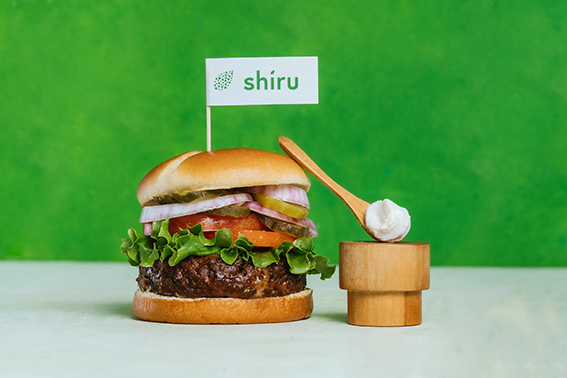
USING CUTTING-EDGE TECHNOLOGY TO UNLOCK A PROTEIN-BASED FAT INGREDIENT
Biotech startup, Shiru, has used the power of AI to develop the first of many novel plant-based fat ingredients for use in alternative proteins. To help design the company’s flagship ‘OleoPro’ ingredient, Shiru’s ‘Flourish’ AI platform scanned 10,000 formulations to find the precise combination of molecules required to reproduce the oil-holding protein scaffold of animal fat.
“The beauty is its flexibility,” suggests Jasmin Hume, the CEO & Founder of the California-based company. “We can use Flourish to develop promising ingredients in areas where today’s solutions are lacking. There’s a need for strategic prioritization, which is why we’re focusing first on full commercialization of OleoPro in alternative meats, but Flourish has potential for other applications such as alternative dairy and personal care.”
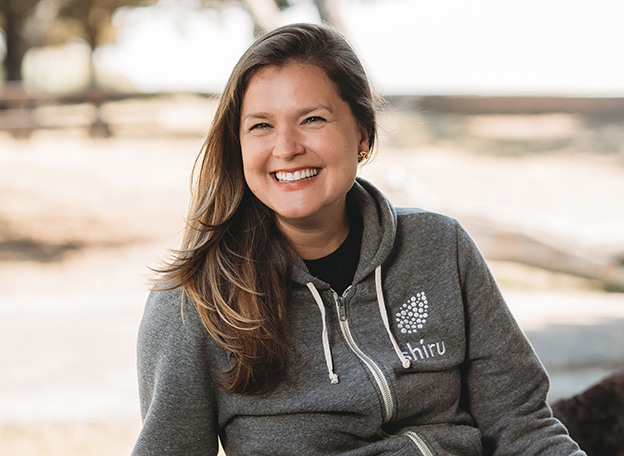
Smoother passage to market
The key technology behind OleoPro is a plant protein scaffold that turns liquid plant oils into a structured fat. This plant protein scaffold is not engineered nor is it the result of chemical processing. Rather, it leverages a selected blend of commercially available raw materials, then uses conventional methods to process them. Using ingredients and technologies that are already commercially available means OleoPro will not face regulatory hurdles beyond those expected of any new food product. It will simply have to have its component ingredients listed on the label.
Shiru’s approach contrasts sharply with methods using precision fermentation and cell cultivation, which have added complexity to scale and potentially face more of a fight to attain regulatory approval. “Although we’re believers in novel technologies to support a more sustainable food future – and we’re using precision fermentation in the development of other ingredients – we’re excited about OleoPro in part because of its scalability and quick path to market.”
Founded in 2019 as a B2B synbio company, Shiru has worked with global food conglomerates including CP Kelco and Puratos. It has been using AI and machine learning since its inception to drive down the cost of molecule discovery and identify natural proteins with high functionality and commercial scope, from a database of hundreds of millions.
Hume says the AI platform was able to develop OleoPro to deliver a performance analogous to animal fats, while being more sustainable. “It delivers the juiciness and mouth-feel you’d expect of an animal-based fat while reducing saturated fat by roughly 80% compared with coconut and palm oil. It’s more sustainable as its primary components are not sourced from tropical regions.”
A huge aim of all manufacturers of alternative fats is to close the meaningful gap in the sensory experience compared with animal meat. “To enable the transition to a more sustainable food system that’s not reliant on imposing environmental taxes on animal agriculture, alternative proteins have to meet expectations for taste and texture, and fat plays a crucial role,” Hume adds. “We’re expanding the toolkit, enabling producers to create better products that catalyze the growth of the industry.”
We’re excited about OleoPro in part because of its scalability and quick path to market
Every product is unique in its formulation and the needs of developers will vary. But OleoPro is self-standing and relatively soft at room temperature – qualities that formulators of new products appreciate. “We’ve heard from customers that have sampled OleoPro that this texture allows for easier incorporation than with a fat that’s harder at room temperature like coconut oil,” says Hume. “While coconut oil has a sharp melting curve and quickly turns into liquid once it reaches its melting point, OleoPro retains much of its structure through heating.”
Shiru launched OleoPro publicly in San Francisco back in March 2023 in a plant-based karaage, developed by formulators at Griffith Foods. “In this format, OleoPro was the main fat component, and provided the juicy, fatty mouth-feel you’d expect in an animal-based karaage. This is the first of many collaborations to come. We’re now also exploring collaborations with some of the world’s largest ingredient companies.”
.jpg)
USING PRECISION FERMENTATION TO RECREATE THE BEST CHARACTERISTICS OF FAT
Swedish food-tech startup, Melt&Marble, is using precision fermentation to produce fats that closely resemble the animal fats in traditional meat products.
“Our flagship product is a meat-like fat designed specifically for meat analogs such as beef and pork alternatives,” reveals Anastasia Krivoruchko, Co-founder. “What sets it apart is its melting profile and functionality, which closely mimic the properties of beef fat. Our specialized fats aim to elevate the overall eating experience, making food more succulent and satisfying. It’s all about superior juiciness and mouth-feel.”

Krivoruchko says the process is highly flexible in terms of what it feeds on, or where it takes place. Unlike conventional fats that often rely on specific sources and locations, the fats can be derived from a wide range of feed-stocks, including various side and waste streams. “By sidestepping the need for extensive land resources, we reduce the environmental footprint but also mitigate the negative impacts on tropical regions, where the use of plant-based oils is linked to elevated rates of deforestation and biodiversity loss. It’s a leap toward a more responsible and sustainable future for fat production.”
The fat also possesses notable nutritional advantages, Krivoruchko suggests. It has lower saturation levels than coconut oil, making it healthier for the heart, and it is cholesterol-free, appealing to health-conscious consumers. “It is also enriched with healthy fatty acids, which can provide various health benefits,” she notes.
Control tweaks
Precision fermentation brings precise control over the composition of fatty acids so the company’s scientists can craft fats that are tasty, but also healthier. “This adds a compelling layer to the broader dietary trend toward functional foods, offering consumers a blend of taste, sustainability, and health benefits. In essence, alternative fats are not just aligning with culinary and dietary trends. They are shaping and enriching them,” Krivoruchko says.
Her journey into food-tech began as part of Professor Jans Nielsen’s Sysbio group at Chalmers University of Technology in Sweden. The group stands at the forefront of research in synthetic biology and metabolic engineering. Along with co-founders, Florian David and Professor Nielsen, she was involved in this research.
The trio founded Melt&Marble as a patent-holding company for their research group. But in late 2020, they came to the realization that plant-based fats still fell short in replicating the sensory experience of animal-based equivalents. “At this juncture, we recognized the potential of our technology to tackle the challenge head-on. Our decision was clear: we would pivot our focus toward creating superior fats for the food industry.”
Melt&Marble is in the initial phases of product development with customers and will launch animal-free dairy fats in the USA next year. Krivoruchko says the technology platform can produce any kind of fats, and could be especially effective in the next generation of cheeses.
Alternative fats are not just aligning with culinary and dietary trends. They are shaping and enriching them
The start-up has also received significant backing from investors. In 2021, it secured €750,000 to prove its concept. Then, last summer, it closed a €5 million seed funding round, led by Lever VC. Be8 Ventures, Good Startup, Nordic Foodtech VC, PINC and Chalmers Ventures all participated in the seed round. The funding was earmarked for scaling production and expanding the team.
In the meantime, Melt&Marble is seeking novel foods authorization in Europe and GRAS affirmation in the USA. “The European process can be notably lengthy and intricate, affecting our market entry in the region. But we are committed to meeting the requirements. We believe our innovative approach to alternative fats will ultimately find its place in the European market.”
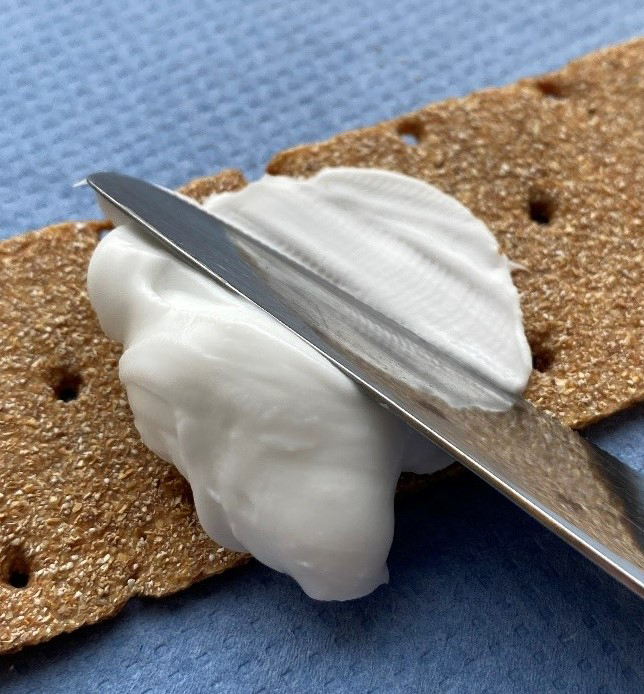
BYPASSING TRADITIONAL AGRICULTURE TO CREATE ULTRA-SUSTAINABLE FOOD INGREDIENTS
A trio of scientists from Sweden have come up with a method of conjuring saturated fats out of the raw materials of electricity and water. The chemists, who created the Green-On start-up three years ago, fully believe their ‘Power-to-Food’ method could “save the world”.
“Sources of saturated fats are animals and dairy, as well as palm oil and coconut oil – all the most unsustainable ones today,” begins Annette Graneli, Co-founder, and a former professor at Gothenburg University. “These are the essential ingredients that are used to produce the creaminess of ice-cream, the meltability of cheese, or the crunchiness of chocolate. As our technology is based on CO2, electricity and water are our raw materials, which gives us several environmental advantages over traditional production.
“We don’t use arable land so there is no deforestation,” Graneli continues. “We don’t need chemical fertilizers or pesticides, and we use far less fresh water. Relying on a chemical process means much less CO2 is emitted, too. Our solution will have a big impact on food security as we can make the fats anywhere, from a desert to much colder places in the northern hemisphere.”
The founders of Green-On are a far cry from traditional entrepreneurs in the food industry. The trio are experienced chemists who have spent large parts of their working lives in research laboratories. Graneli’s colleagues, Marcus Vestergren and Anders Lorén, worked for many years developing the Power to Food concept at RISE, the Swedish Research Institute.
Power to Food concept
Their research demonstrated the feasibility of concept at the lab scale. The process uses electrical energy to split water into hydrogen and oxygen. Reacting to the hydrogen, the CO2 can be converted into chemical intermediate substances. Commercially available technologies then transform these substances into saturated fats that are similar to animal- or palm oil-derived ones.
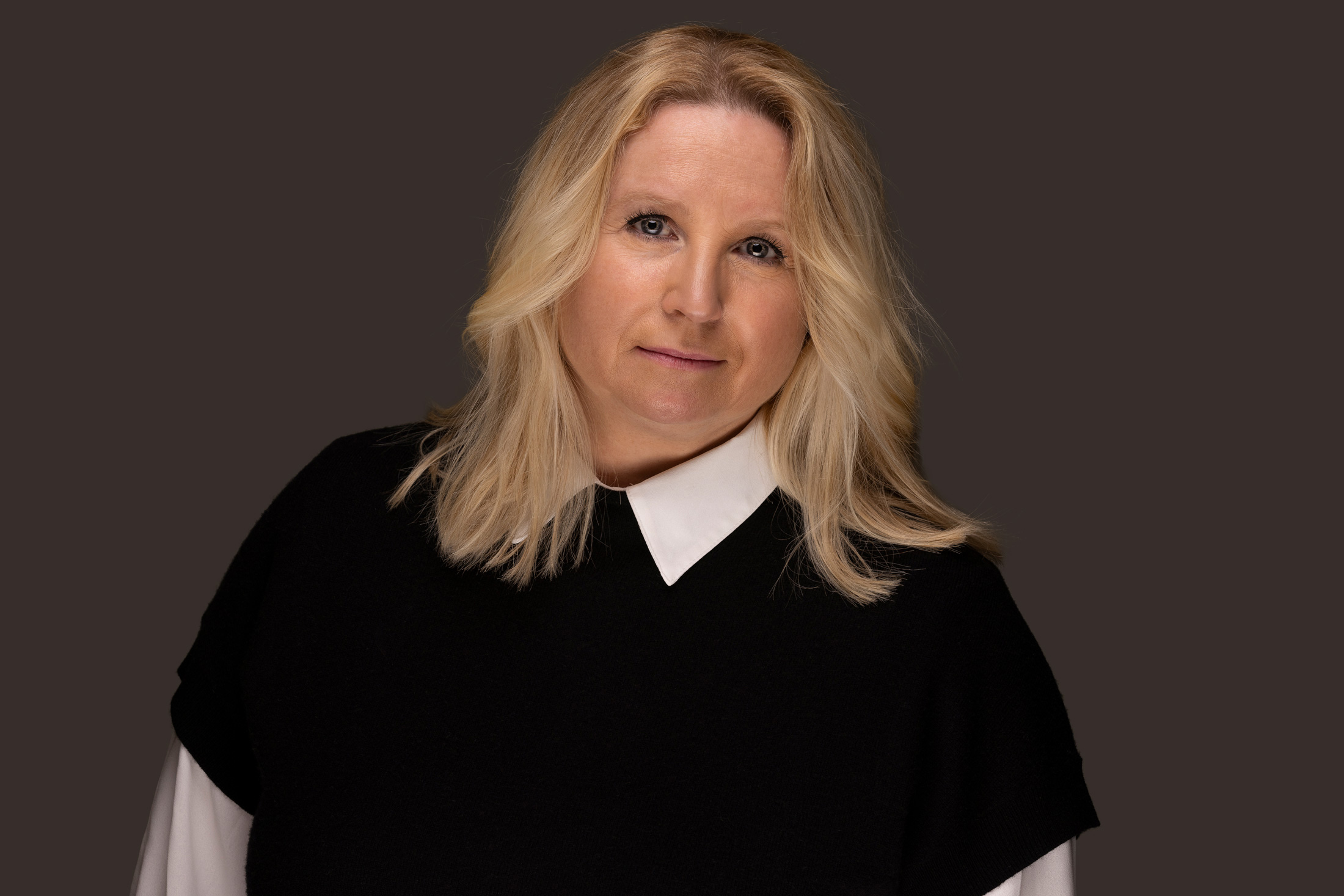
With funding from Vinnova, the Swedish Innovation Agency, Lorén and Vestergren were able to demonstrate at RISE that their concept worked for common fat types known as triglycerides, as well as free fatty acids such as palmitic acid and caprylic acid. And by 2021, the co-founders were ready to start commercializing their strategy with Green-On. The first step was to create the cooking oil and butter-like fats. Next, in 2024, they intend to build a pilot plant with a view to going to market in another three to five years.
Graneli maintains that the products created by the Power to Food method will perfectly suit the requirements of people who want to eat sustainably without compromising their pleasure in consuming food. “We’re making a fat that’s neutral in smell and taste, and can be used in a variety of applications. It will have the same impact on the functional behavior, melting point and mouth-feel as less environmentally sustainable options. And there’s an added advantage of our saturated fat: the length of the specific triglycerides, the fat molecules, can be varied and we can make fatty acids that are produced in scarce quantities in nature.”
Our solution will have a big impact on food security as we can make the fats anywhere, from a desert to much colder places in the northern hemisphere
Green-On’s innovative approach has attracted investment that has made commercialization a feasible goal once regulatory hurdles are overcome. Big Idea Ventures, a global leader in early stage investing in the food technology sector, invested in the company in 2021 as part of its US$50 million ‘New Protein Fund’. Green-On was one of 17 companies chosen in the accelerator cohort for developing and improving protein alternatives across the value chain.
Then, last July, Green-On announced two new investors. The first was the Swedish food-tech company, AAK, which is already a global presence in the manufacture of plant-based oils and fats. The new partnership was an initiative of Big Idea Ventures, which aims to put corporates and start-ups together. Meanwhile, the second new investor, Norrsken Impact Accelerator, is an early startup fund that supports solutions that aim to solve climate change.
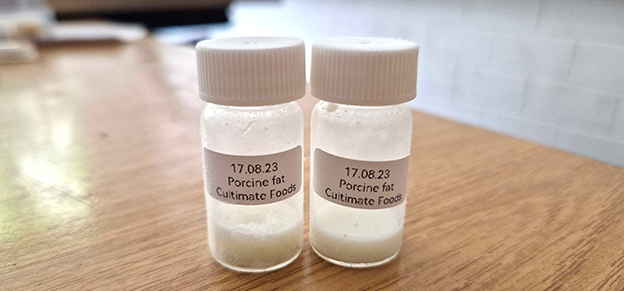
BRINGING AN AUTHENTIC ‘MEATY’ TASTE AND TEXTURE TOPLANT-BASED MEAT
The Germany-based biotech startup, Cultimate Foods, is producing real animal fat using cultivated animal cells. George Zheleznyi, Co-Founder & CEO, believes the answer to delivering authentic meat flavor is to engineer intramuscular fat, particularly as it’s responsible for a lot of the marbling and flavor properties.
“There are lots of different types of fat in a typical piece of meat you buy in the grocery store and the scientists at our laboratory in Hannover carried out a lot of studies to find out which fats had the biggest influence on flavor,” Zheleznyi reveals. “The one that made the biggest difference was intramuscular fat, which is contained in high percentages in premium meats such as steaks. The fatty acids are very different from all other types of fat and the taste and aroma are very concentrated.”
We’re closing the next round of funding soon and hope to have another €2 million to invest to scale up production
The Cultimate Foods’ scientists decided to recreate intramuscular fat in the laboratory using cellular agriculture. The company raised a first round of €700,000 from investors last year, including the German meat industry, and the venture capital fund Big Idea Ventures, and devised a four-stage process to produce the fat.
Stage one involves taking tissue samples from biopsies of animals, which at this stage are pigs and beef cattle. On that, the company has developed a broad network of organic farmers based near its laboratory. The scientists isolate the particular type of cells, then, at stage two, they grow the population of stem cells in a bioreactor to achieve a mass they are happy with. "Our skill is in differentiation of the right fat from these stem cells,” says Zheleznyi. “We need particular lipids, the fatty acids inside the cell membrane.”
Stage three involves using the fat cells to formulate an ingredient. Finally, at stage four, the team has to ensure the stability and shelf life of the product. This requires experimentation on different forms of the ingredients, which can be delivered in semi-liquid state, or as a powder. With the finished product, the team is able to begin discussions with companies that are looking to innovate their portfolios.
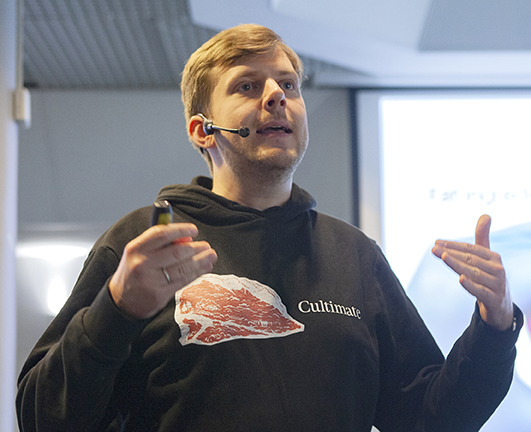
Customer interest
Cultimate Foods, which only began work last year, already has a couple of dozen potential customers and is running three pilot programs. “One pilot with a regional producer is to different infusion rates of fat into plant metrics,” Zheleznyi reveals. “And we’re also testing combinations of different plant proteins with our animal fat. We look at how the soil reacts, how the protein reacts, the mycelium, and so on. This client is a global food company that has plant-based meat.”
The biggest challenge the company faces right now in these early stages, Zheleznyi notes, is satisfying the demand for samples. “We’re at the lab scale and we cannot produce enough for 20 customers to test right now. But we’re closing the next round of funding soon and hope to have another €2 million to invest to scale up production.”
In 2018, Zheleznyi was the founder of the Russian plant-based alternatives company, Greenwise, which grew rapidly and had its products in 10,000 stores in the Russian-speaking world. But Zheleznyi sold his shares after realizing there was a “ceiling of adoption” for their products. “They were purely plant-based and to push the industry forward, I knew we needed a change to the formulas to elevate the taste. I knew the secret was bringing more animal fat into the recipes as the plant oils have a totally different melting point.”
Regulation remains a challenge, Zheleznyi concedes. The quickest progress is likely to be in Singapore and the USA, although he is hopeful the post-Brexit UK market will open up, too. “The UK landscape has changed as they no longer have to follow the rules of the European Food Safety Authority so they can decide for themselves. And it’s obviously a big market for plant-based foods.”
The EU is a tougher obstacle though. “There are 27 countries that all need to agree, and some have conservative approaches. Italy, for example, wants to ban all novel cultivated foods. The EU has not approved a novel food product for a long time, so it might take a little longer there. But we cannot wait for that market to open up, and we will aim first to expand in other markets,” he says.
If you have any questions or would like to get in touch with us, please email info@futureofproteinproduction.com
More Features

Feeding change

Protein Pioneer: Kesha Stickland








